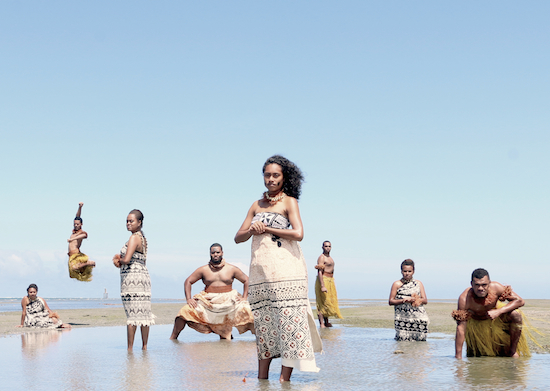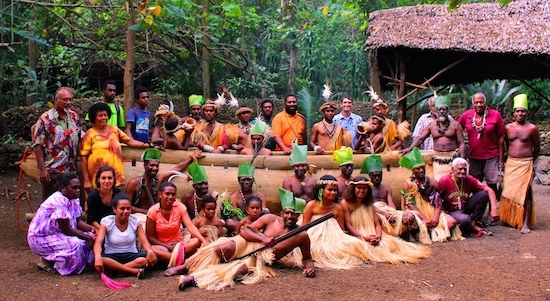The People's Climate Mobilisations in New York and across the world are set to turn out hundreds of thousands of people this coming weekend in what is likely to be the biggest citizen-led push for climate action yet. Will all the energy from the mobilisations just dissolve in the weeks that follow? If the Pacific Climate Warriors have anything to say about it, the answer will be no.
That's because just four weeks after the People's Climate Mobilisations, on October 17, 30 Pacific Island "Climate Warriors" are going to paddle in canoes that they have built, into the oncoming path of coal ships in the world's largest coal port -- Newcastle, Australia. Behind the Warriors will be hundreds of Australians in kayaks, on surfboards and other small craft. The aim is to stop coal exports from the port of Newcastle for a day. That's approximately 560,000 tonnes of coal - in one day.
If the port were a country, it would be ranked 9th in the world in terms of emissions. That's coal at an almost unimaginable scale - and there are plans to expand it even further with an additional terminal.
If nothing is done to transition away from the fossil fuel industry in Australia and elsewhere around the world, many of the Pacific Islands could lose everything to sea-level rise, and other climate driven impacts. As such, this is not some action born out of ideology or conceived of by "radical greenies", but one born out of necessity for cultural and physical survival.
Such necessity for action in the face of climate change was called into force earlier this month. Activists in Massachusetts, USA, had used a lobster boat to block a 40,000 tonne shipment of coal for a day. They were charged, amongst other things, with conspiracy and disturbing the peace. In their defence, for the first time in US history, they called on the "necessity defence" in the face of climate change. The necessity defence is a legal doctrine that claims it is acceptable to commit a crime if you are preventing a greater harm. In this case, it means that they had no alternative to acting given the consequences of inaction on climate change.
The district attorney sympathised with this point of view, either dropping or downgrading the major charges. His explanation:
Climate change is one of the gravest crises our planet has ever faced. In my humble opinion, the political leadership on this issue has been gravely lacking.
That failure of political leadership in Australia and around the world is what makes this Pacific Climate Warrior blockade of Newcastle Port necessary now.
Over the last five years I've spent much of my time working with young people across the Pacific Islands. I've sat with them as they face the harshest of realities that, in places like the Marshall Islands, Kiribati, Tuvalu and Tokelau, if the world keeps burning fossil fuels at the pace it currently is, they will have no home in 30 or 40 years time.
Whilst many tell them that it is hopeless, or that it is too late for the Pacific, they are not prepared to accept this future for their islands. This land is part of them, their ancestors are buried there, it is where they belong. Losing it would be like losing themselves.
It is crucial then that anyone who empathises with the struggle of the Pacific Islands doesn't disempower them in this fight. For too long that has been the case. Yes, the odds are stacked against them, but the last thing they need is for others who would be their allies to give up on them. Talk of them as "drowning islands" and lamenting that they're destined to become climate refugees is enacting dangerous psychological damage upon Pacific Islanders and the world at large. It is creating the world we do not want - just because it seems impossible to fight for and win the world that we do want.
For anyone who believes that the Pacific Islands belong above water, not under, our work is to genuinely stand with the Pacific in this fight. Their fight is our fight.
The work we must do together is to find ways to keep coal, gas and oil in the ground, at the very time when the fossil fuel industry plans on doing the opposite. They plan to dig up, and burn 4 - 5 times more fossil fuels than we can burn to limit warming to 2 degrees. They're trashing our carbon budget. This means that right now the world faces 3-4 degrees of warming, which would cause 60cm of sea level rise or more. With just 60cm of sea level rise, any atoll island like Tuvalu or Kiribati will become unlivable.
Our work is not to despair and give up to this future, but to act bravely, take risks and do the work that necessity calls for. There's something deeply empowering about the necessity clause, because if we realise it, we all have the right and potential to act out of necessity. And furthermore public institutions have the grounds to acknowledge and act in solidarity with these expressions of necessity. It is up to us citizens to take this opportunity and test it. That's our work in the weeks and months that follow the People's Climate Mobilisations.
There is no winning or losing for the islands. All there is is the necessary fight to survive. We will fight and fight and keep fighting, until we don't have to fight anymore.
Stand with the Pacific Climate Warriors, visit 350.org/warriors


